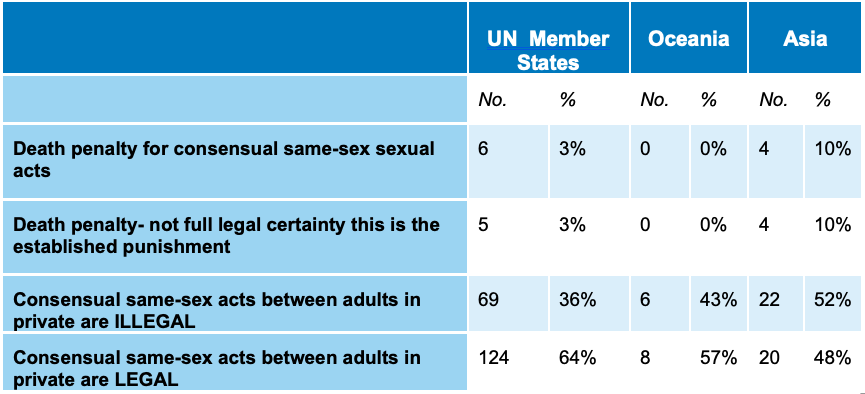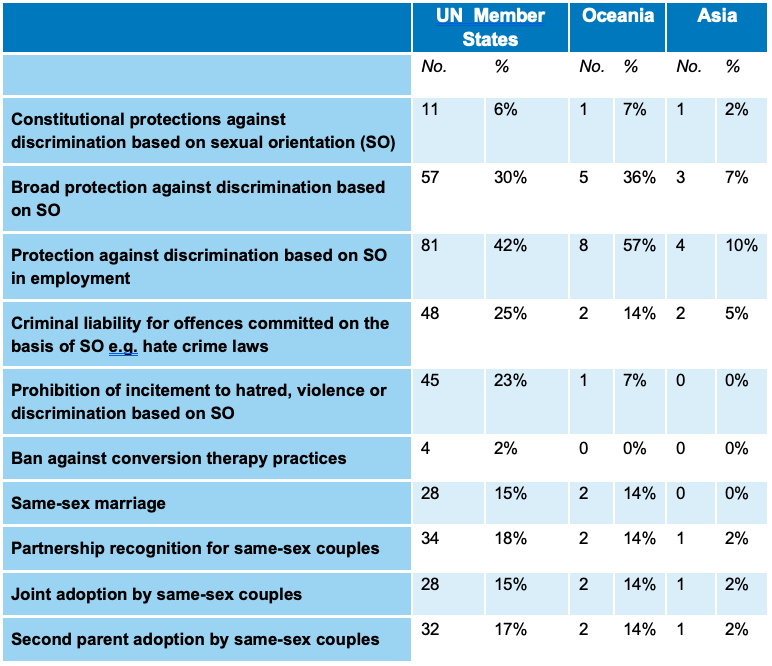Being L, G and B in Asia Pacific
Updated
by Faso Aishath
Introduction
Criminal laws, violence, and discrimination target lesbian, gay and bisexual (LGB) people because of their sexual orientation. These issues are frequently raised in recommendations by other countries during the Human Rights Council’s Universal Periodic Review process. Often, lesbian, gay and bisexual people’s experiences are compounded by intersectional discrimination and disadvantage. For example, violence against lesbian and bisexual women often occurs within the family, and could be incorporated into an NHRI’s work on gender-based violence.
Human Rights Issues
The factsheet focuses on four key human rights issues for lesbians and gay and bisexual people in the region, followed by some examples of relevant work done by NHRIs in Asia Pacific.
Each section starts with a summary table of available relevant statistics about the situation for LGB people in Asia and in Oceania (the Pacific, Australia and New Zealand) compared to UN member states globally. These are drawn from ILGA World’s 2020 State-Sponsored Homophobia report.
1. Dignity and criminalisation

Criminalisation today can take many forms. It can be directed towards punishing:
· certain sexual behaviour,
· acting or dressing in ways that do not conform to dominant cultural expectations, including so-called ‘cross dressing’, based on an assumption that a feminine man is gay and a masculine woman is lesbian,
· statements or publications or actions that discuss or refer to lesbian, gay and bisexual people.
The criminal laws have been uneven in their terminology and scope. Sometimes they refer to same-sex activity indirectly, through use of terms like ‘unnatural acts’ or ‘unnatural sex’ or ‘acts against the order of nature’ or ‘acts of gross indecency’. Some laws use the terms ‘sodomy’ or ‘buggery’. Sometimes they apply to male same-sex activity but not female. Sometimes they specifically cover ‘homosexual and lesbian intercourses’.
Consequences
Criminal laws targeting lesbian, gay and bisexual people have both direct and indirect effects on human rights.
Directly, they impose treatment and punishments that violate human rights, including arbitrary detention, torture and cruel, inhuman and degrading punishment, and arbitrary execution.
Criminal laws provide a legal basis for police to detain lesbian, gay and bisexual people. When detained, lesbian, gay and bisexual people suffer from indirect consequences of these criminal laws by being at greater risk of harassment and physical and sexual assault.
2. Safety and violence
The existence of criminal laws against lesbian, gay and bisexual people increases the risk of violence but, even where there are no criminal laws, lesbian, gay and bisexual people encounter significantly greater risks of being subjected to violence than other people.
Prevention
Violence intervention and prevention are difficult, particularly for lesbian, gay and bisexual young people who can be trapped by age, economic dependence, lack of agency and lack of mobility. Much of this violence is perpetrated by public officials, in particular by law enforcement officials, especially the police.
Protection
State obligations under international human rights law include the obligation to protect human rights. International human rights mechanisms have said repeatedly that the State bears responsibility for human rights violations perpetrated by non-State actors where the State has failed to provide an adequate level of protection. Family and relationship violence has been signalled out repeatedly for specific mention in this respect.
Reporting
Lesbian, gay and bisexual people are more reluctant than most to report violence to the police because of the fear of exposure of their sexual orientation or even worse treatment on the basis of their sexual orientation. These concerns are likely to be heightened for lesbians and bisexual women, including in communities where women are blamed for violence against them. Similarly, lesbian, gay and bisexual sex workers may be very reluctant to approach police about sexual assaults, particularly if sex work is criminalised.
3. Equality and discrimination

Discrimination based on sexual orientation is evident in all countries in this region and there are very few laws providing protection against discrimination.
The High Commissioner for Human Rights and special procedures (independent experts) established by the Human Rights Council have reported that lesbian, gay and bisexual people are deprived of access to basic rights. These include lack of employment, health, education and housing leading to very few economic opportunities, resulting in poverty. Studies, including research within countries from Asia Pacific, suggest that rates of poverty, homelessness and food insecurity are higher amongst LGB people than in the wider community.
Discriminatory practices are commonly encountered by lesbian, gay and bisexual people in relation to:
· health care (e.g. degrading treatment or refusal of care)
· education (e.g. bullying and harassment at school)
· employment (e.g. not being hired or being fired because of their sexual orientation)
· housing (e.g. being evicted from the family home or refused rental accommodation)
· asylum and migration (e.g. being denied visas based on their sexual orientation or being told asylum is not necessary if they did not disclose they are gay)
· family and community (e.g. being forced to marry or taken to a community leader who will try to change their sexual orientation) and
· relationship recognition (e.g. if a same-sex couple cannot legally get married, not giving them the same rights as other unmarried couples).
4. Freedom of expression, assembly and association

The rights to freedom of expression, assembly and association concern a person’s ability:
· to speak freely about their lives, their experiences and their needs, in publications, the arts and literature and in public forums,
· to form and participate in lesbian, gay and bisexual advocacy and social groups and
· to associate with other people based on their shared sexual orientation.
United Nations mechanisms have identified many areas in which these fundamental freedoms of lesbian, gay and bisexual people are curtailed in many States, including through:
· direct censorship
· bans on dissemination of information
· restrictions on advocacy
· denial or revocation of organisations’ registration
· denial of permission to hold meetings and events
· disruption of meetings and events
· raiding offices
· vandalising offices and burglary and arson
· harassing and arresting staff and volunteers
· confiscating materials and equipment, such as computers
· denial of permission for gay pride marches and events
· violence and harassment at gay pride marches and events
· lack of proper and adequate police protection from violence, harassment and other forms of harm to lesbian, gay and bisexual people, especially activists, and to their groups and property.
Some work by NHRIs on lesbian, gay and bisexual issues
Many of the following examples of the work done by NHRIs in Asia Pacific on human rights violations against lesbian, gay and bisexual people have been developed as broader consultations with LGBTQI communities. For example, work to address conversion practices in this region initially started with a focus on harmful practices that attempt to change or suppress a person’s sexual orientation. Within some of these NHRI consultations, including in Samoa and Fiji, there has been a recognised need to ensure participation of under-represented groups, particularly lesbians and bisexual women.
- The Australian Human Rights Commission commenced its extensive Same-sex: same entitlements Inquiry in 2006 and reported in 2007. In 2008, the Australian parliament enacted laws to implement the Commission’s recommendations, amending 84 discriminatory laws.
- In 2011, the National Human Rights Commission of Korea delivered an opinion to the Constitutional Court challenging, as unconstitutional, a provision in the Military Criminal Law that criminalised same sex conduct. The Commission has also recommended the enactment of a comprehensive anti-discrimination law that includes sexual orientation and gender identity as prohibited grounds of discrimination.
- In 2013, the UN Special Rapporteur on Myanmar recommended action by both the government and the NHRI after 12 gay men and transgender women in Mandalay were verbally, sexually and physically assaulted by police officers who arrested them on allegations of creating a public nuisance. The Myanmar National Human Rights Commission referred the case directly to the chief of police, though the police did not release any information about investigation of these complaints.
- Komnas HAM in Indonesia has previously called for a widespread public information campaign about society’s responsibility to promote and protect LGBT people’s human rights, and the need for programmes to address past abuse.
- For the 2017 International Day Against Homophobia and Transphobia, the Commission on Human Rights of the Philippines reached out to lesbians (and also trans men) in detention.
- In the Pacific, both the Office of the Ombudsman of Samoa and the Fiji Human Rights and Anti-Discrimination Commission held consultations with LGBTI communities in 2018, with a focus on identifying the distinct and overlapping SOGIESC issues, and with the intention of developing national plans of action.
- The Human Rights Commission of Sri Lanka has created a Sub-Committee on LGBT rights. The Sub-Committee wrote to both the Sri Lanka Medical Council and the Ministry of Health, listing medical centres that were offering ‘to cure homosexuality’ and calling for action against such practices. The NHRI also invited the Sri Lanka College of Psychiatrists to a meeting with LGBT community members to discuss the adverse effects of conversion practices. None of these requests were taken up by the relevant agencies.
- The National Human Rights Commission of India has established a Core Group on LGBTI issues, which brings together community representatives, government officials, legal and policy experts, and NHRC participants. After its meeting in November 2020, the Core Group recommended that “strict and mandatory laws against forced conversion therapy should be formulated”.
Key points
- There may be more than 220 million lesbian, gay and bisexual people in the Asia Pacific region.
- Lesbian, gay and bisexual people in the region have many common experiences. In addition, lesbians and bisexual women have distinct experiences, arising from their situation as women that must be taken into account in ensuring respect for their human rights.
- Criminal laws targeting lesbian, gay and bisexual people have both direct and indirect effects on their enjoyment of their human rights. Whether enforced or not, they undermine the dignity of lesbian, gay and bisexual people.
- Individually and as a group, lesbian, gay and bisexual people are marginalised and often targeted for violence on the basis of their sexual orientation. The State often fails to ensure their safety.
- Discrimination based on sexual orientation is evident in all countries, including in this region. It denies the equality of lesbian, gay and bisexual people.
- Lesbian, gay and bisexual human rights defenders are often targeted because of their advocacy. They experience violations of their rights to expression, assembly and association.
- In all countries, there are opportunities for NHRIs to build support for human rights protections for LGB people. One of an NHRI’s roles is to promote the universality of human rights protections, including through public education, training law enforcement agencies, and dialogues with legislators and policy makers.
Download this article (PDF): SOGIESC Fact Sheet 2 - Being LGB.pdf
Download this article (word document): SOGIESC Fact Sheet 2 - Being LGB.docx
